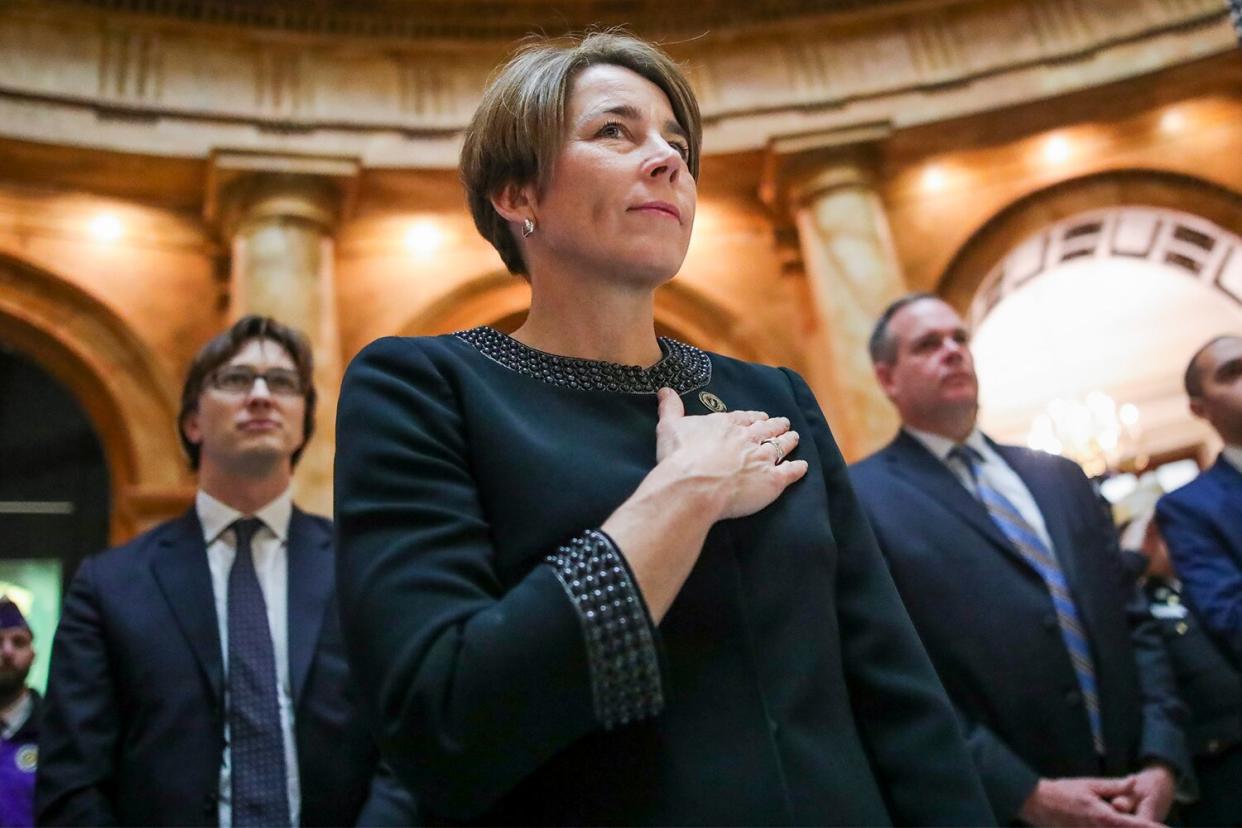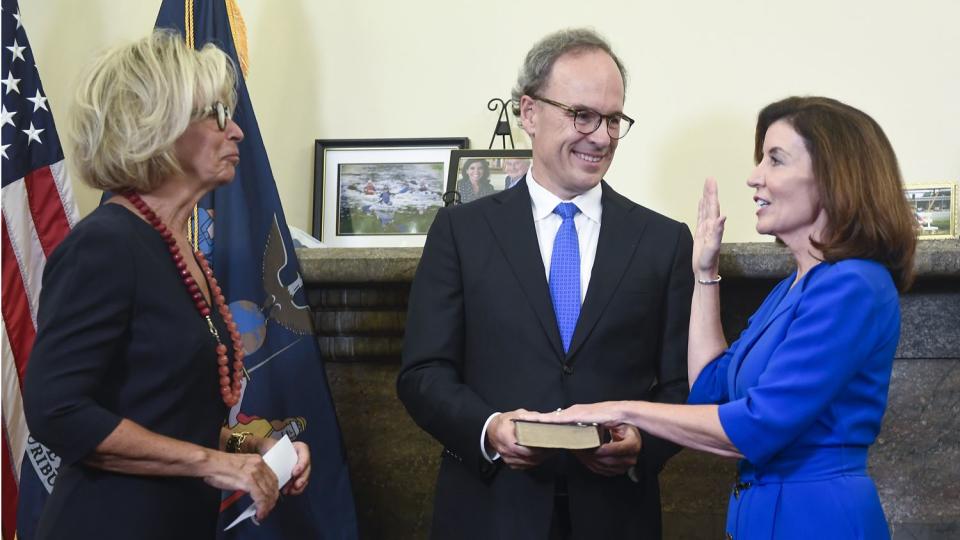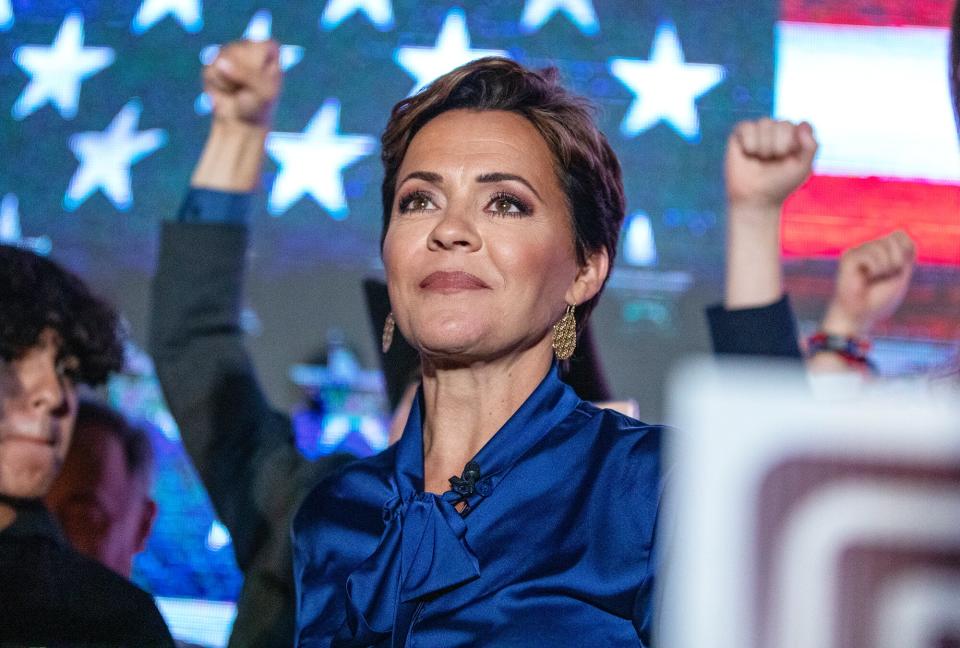The U.S. Has Never Had More than 9 Female Governors at a Time — That Can Change in November

Nicolaus Czarnecki/MediaNews Group/Boston Herald via Getty Maura Healey, Democratic candidate for Massachusetts governor
There are only nine female governors in the United States currently, and eight of them are running for reelection, meaning the number could fall.
However, this election cycle has five gubernatorial races in which female nominees are running against other women — a record — and that guarantees at least five female governors after this election. In Oregon, three women are vying against each other for the state's top job: a Democrat, a Republican, and an independent.
An additional half-dozen women are favored to win races against men, and that spells progress, says Debbie Walsh, director of the Center for American Women and Politics at Rutgers University.
"We've been stuck at nine [female governors] for a very long time — we've never exceeded the nine," she says of the stall in progress since 2004. The potential this election for 11 or 12 female governors, filling a possible 24% of overall governor seats, is significant. "It's not nearly what we want to see. Women make up 51% of the population. But we're talking about at least breaking through," she says.
RELATED: Meet All of the Election Winners Who Are Breaking Barriers with Historic Wins
There's a stereotype about who can be a chief executive, whether it be a governor or the president of the United States. "It's a very male image with very male traits attached to it," says Walsh. "People don't necessarily see the strengths that women bring even though we know, of course, that they do. And they've been very successful when they've been governors of states."

Hans Pennink-Pool/Getty Images Kathy Hochul becomes the first female governor of New York
"There seems to be a differential between executive office and legislative office, and that's the glass ceiling that I think women are still trying to break," she says.
Rather than being the ultimate authority, women are seen as collaborators and committee members. "Being the place where the buck stops is still breaking that stereotype, still disrupting some of that image of who can lead — that's the challenge that women face," Walsh says.
To increase the number of women in elected offices, more women have to run. Seven women ran for governor of Oregon, and five ran in Alabama this year, signaling momentum. Women are more likely to be funded by small dollar donations, so they have to spend more of their precious campaign time fundraising than male counterparts. And women often have to run against well-connected incumbents because they are the newcomers.
They are also more likely to be criticized in the media for their clothing choices, their tone and their facial expressions. Walsh said that's even true for women who are running against other women.
Still, these female contenders are not shying away from being tough campaigners. Katie Hobbs, the Democratic gubernatorial nominee in Arizona, announced she wouldn't debate Republican nominee Kari Lake, whom she said is a conspiracy theorist. Tudor Dixon, Michigan's Republican gubernatorial nominee, called for the state's schools superintendent to resign for supporting gender-neutral bathrooms and transgender athletes. Georgia's Democratic nominee, Stacey Abrams, who could become the first Black female governor in U.S. history, worked for years to protect voting rights in Georgia and the country knowing that Black voters were targeted.
They are not saintly. Women participate in negative campaigning and use violent imagery in campaign ads just as the men do, Walsh says.

Caitlin O'Hara/Bloomberg/Getty Kari Lake, Republican candidate for Arizona governor
Walsh has studied the slow political progress of women for four decades because she believes it's important for women to hold political positions. "It's about representative democracy. All of our citizens should not be represented by white male attorneys in their 50s and 60s — and 70s and 80s," she says.
RELATED: Nearly 3 in 4 Americans Support Age Limits for Politicians — but What Should the Maximum Age Be?
While men in elected offices tend to say they sought a career in politics, women tend to enter the arena because they want to solve a specific issue.
"Women do bring different policy issues to the forefront," Walsh says. "If you are looking at policy through that gender lens, you may see something in a piece of legislation that your male counterpart may not see. It might not even have occurred to him. Women are more likely to prioritize issues that affect women, families, and children, and look at policy to see what impact it will have on women, families, and children."
Historically campaign experts have steered female candidates away from talking about personal experiences, especially concerning their own children, because voters may worry that if they're elected, nobody will be around to take care of the kids. In the past couple of years, women running for office have tossed that norm aside, freely talking about motherhood and family issues. Voters seem to respond, Walsh says.
RELATED: Broad City Star Ilana Glazer: 'As a Queer Jewish Mama, I'm Gonna Be Patriotic as Hell' This November
Women have made great strides in legislative seats, especially among Democrats, but they still hold less than a third of all positions at every level, from the U.S. Senate to municipal offices. While the U.S. House of Representatives and Senate saw a record cohort of women in 2020 — 144 — it was still just 27% of total seats.
The Supreme Court's decision to strike down Roe vs. Wade on June 24 was past filing deadlines, too close to affect women's decisions to run this year. But Walsh says 2024 may see many more women enter the political arena because of the abortion issue. Women outvote men, and, on the Democratic side at least, may be motivated by a woman on the ballot, she says.
Never miss a story — sign up for PEOPLE's free daily newsletter to stay up-to-date on the best of what PEOPLE has to offer.

